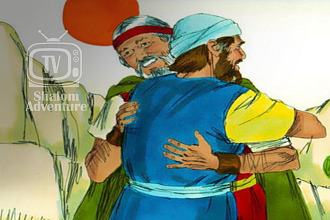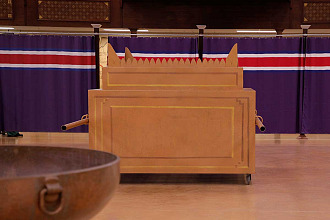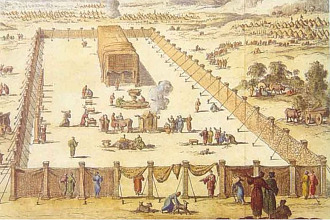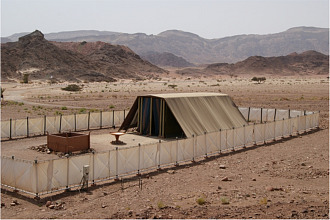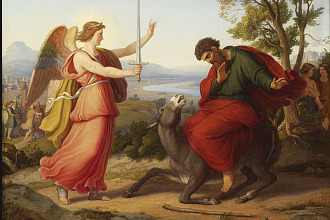Parasha for the Week: Kedushim: Leviticus 19:1 – 20:27
Aftarah Ashkenazim: Amos 9:7 – 15
Aftarah Sephardim: Ezekiel 20:1 – 20; 22:1 - 19
Besorat Yeshua: Mark 2:1 - 17
Overview
The nation is enjoined to be holy. Many prohibitions and positive commandments are taught:
Prohibitions:
Idolatry
Theft and robbery
False oaths
Delaying payment to an employee
Hating or cursing anyone
Gossip
Placing physical and spiritual stumbling blocks
Perversion of justice
Inaction when others are in danger
Embarrassing others
Revenge
Bearing a grudge
Cross-breeding
Wearing a garment of wool and linen
Harvesting a tree during its first three years
Gluttony and intoxication
Witchcraft
Tattooing.
Positive:
Awe for parents and respect for the elderly
Leaving part of the harvest for the poor
Loving your neighbor as yourself
Eating in Jerusalem the fruits from a tree's 4th year
Awe for the Temple
Respect for Torah scholars
Respect for the blind and the deaf.
"Holiness"
The frame of this Parasha is about holiness, holiness in a biblical meaning "I have set you apart from the nations to be my own" The portion begins, "The LORD said to Moses, "Speak to the entire assembly of Israel and say to them: 'Be holy because I, the LORD your God, am holy." Lev 19:1-2. The portion ends, "You are to be holy to me because I, the LORD, am holy, and I have set you apart from the nations to be my own." Lev. 20:26.
Why is the commandment "You shall rebuke your neighbor," written between the commandments of, "You shall not hate your brother in your heart," and, "You shall love your neighbor as yourself"? This teaches us that the act of admonishing someone must be done with love and only out of sincere concern for the person's benefit. According to the Baal Shem Tov, "Love your neighbor as yourself," implies that just as you love yourself with all your shortcomings and faults, you should love the other person regardless of his or her faults.
What is the reason for the connection between, "love your neighbor," and, "I am the Lord?"
"Love Your Neighbor"
The Torah states, "Love your neighbor as yourself, I am the Almighty" (Leviticus 19:18). Why is the commandment to love our fellow human being followed by the words "I am the Almighty"? Rabbi Chasam Sofer clarifies that by another explanation, he said that while the commandment to love our fellow man is a concept that anyone can relate to with his own intellect, the Torah tells us to love our fellow man because it is the Almighty's will. If your love of other people is based only on your own feelings, there could easily be a lack of consistency. One day you might feel positive towards someone and on the next day your feelings can change. However, the Torah states that the Almighty commands us to love others. We need to develop positive attitudes towards others by allowing God to fill us with His heart.
How can the Almighty command us to love our neighbor? Some of us have neighbors that are awfully hard to appreciate! However, if the Almighty commands it, it must be possible. Because by His power all things are possible. If you ask a pregnant woman if she will love her baby, she'll look at you like you're nuts and say "Of course!" Then you can ask her, "How do you know? Maybe he'll be like your neighbor!" A pregnant mother knows she will love her baby because she chooses to love that baby. And what if the baby grows up to be an irresponsible teenager flunking out of school who doesn't make his bed? She'll still love him! How? She focuses on his good points! "He has a good heart! He's got a sweet personality! He helps when I ask him to." We can choose by God's grace to focus on the positive.
"Before Reproving Your Neighbor"
The Torah states: "You shall reprove your fellow human being." Leviticus 19:17. When someone tries to criticize or reprove another person, it is obligatory for those words to come from the depths of his heart. The Sages have said that only those words that come from the heart will enter the heart of the other person. Therefore, if your words of correction are not an expression of your inner feelings of care and concern for the welfare of the other person, they will not have a positive influence on the person with whom you are speaking.
"He who loves God will not only love his fellow men, but will regard with tender compassion the creatures which God has made. When the Spirit of God is in man it leads him to relieve rather than to create suffering." (SD52)
"This is the Entire Torah"
The Talmud (Shabbos 31a) tells the story of a non-Jew who came to the great sage Shamai and said, "I want to convert to Judaism on the condition that you teach me the entire Torah in as short a time as I can stand on one foot." Shamai refused. He then went to the second great sage of that time, Hillel and said, "Convert me on the condition that you will teach me the entire Torah while I stand on one foot." Hillel accepted his condition and told him, "What you dislike, do not do to your friend. This is the entire Torah."
Rabbi Akiva says that the commandment of "Ahavat Yisrael" ("Love your fellow as yourself") is the most fundamental mitzvah in the Torah. It is not only the basis for the mitzvot between one and the other, but also for the mitzvot between us and G-d.
Since Hillel was referring to the commandment of love your neighbor, why didn't he just mention the words of this verse?
Rabbi Yeruchem Levovitz explains that this is to teach us an important principle. From the words, "love your fellow man" one might think that as long as one feels the emotion of love towards others one fulfills this commandment. However, the truth is that just feeling love alone is not sufficient. Rather, this love must motivate us to do positive things for others and to refrain from any actions or words that could cause someone any pain or suffering.
The Torah definitely requires us to feel deep love for others in our hearts. Even more than that, our behavior towards others must manifest this love. Therefore, Hillel explained to this man that a basic Torah principle is that the same commandment which requires us to have a profoundly positive feeling for others also requires us to behave in an elevated manner in our daily encounters with them.
AFTARAH Ashkenazim: Amos 9:7 – 15
AFTARAH Sephardim: Ezekiel 20:1 – 20; 22:1 - 19
Haftara 1: In the book of Amos, the Lord reproaches Israel for what they have done and for their unfaithfulness. However, even though G-d is going to punish Israel, he is very clear Israel's destiny. He said in Amos 9:8: I will not utterly destroy the house of Jacob, says the LORD. He will not entirely destroy the house of Israel. That is why we can witness, two thousand eight hundred years after that prophecy, that Israel is still here on the earth, witnessing for G-d. A great promise is given by the prophet Amos: On that day I will raise up the booth of David that is fallen, and repair its breaches, and raise up its ruins, and rebuild it as in the days of old (Amos 9:11). The booth or tent of David is the royal power of the house of David. This tent of David represents the house of the Messiah, the son of David, that began to be built at the coming of the Mashiach Ben David (Acts 15:16), and which will be completely rebuilt when the Mashiach returns to gather together all his people, both Jews and Gentiles.
Haftara 2: In the book of Ezekiel, God's speech is quite similar but G-d is more precise about the witnessing function of Israel; the sign of their witness is the Shabbat. "Moreover I gave them my shabbats, as a sign between me and them, so that they might know that I the LORD sanctify them" (Ezekiel 20:12). The sign of the Shabbat is so important that the prophet repeats this sign in another way: "Keep my Shabbats that they may be a sign between me and you, so that you may know that I the LORD am your God (Ezekiel 20:20). In verse 12, the Shabbat is a sign for Israel but in verse 20 the Shabbat is also a sign for non-Jews, the Gentiles, to show them that it is the Lord who sanctifies His people. This last verse reminds us of the universality of the Shabbat which was given at creation by the L-rd to all humanity (Genesis 2:1-3).
Besorat Yeshua Mark 2:1 - 17
Parasha: Usually the text of the parasha for this week is together with the parasha for last week. Acharei Mot and Kedoshim are read together. This year is a leap year, longer than other years, so we read them separately, although the text of the Besorah is the same.
Besorah: We have the perfect example of holiness in the life of Yeshua. That's why the people of Israel they loved him, loved his teaching, and loved his deeds. In our Besorah we see Yeshua arriving in Capernahum, in the house of Peter and many people came to the house to see him, to listen to his teaching. When He returned to Capernaum after some days, it was reported that He was at home. So many gathered around that there was no longer room for them, not even in front of the door; and he was speaking the word to them. (Mark 2:1-2). People from Capernahum were sure that Yeshua can heal every sickness, that's why a group of friends came to Him with a paralytic. When Yeshua saw their faith, he said to the paralytic, "Son, your sins are forgiven." (Mark 2:5) We see in these word of Yeshua all his affection for human beings. The leaders of Israel, did not see the glory of G-d through this miracle, they thought that Yeshua was blaspheming, but in fact as the Mashiach he had the power to forgive sins.






